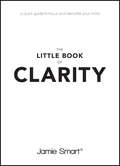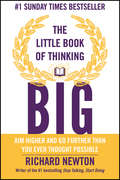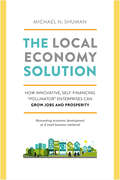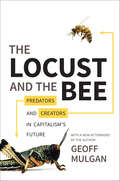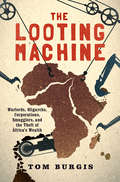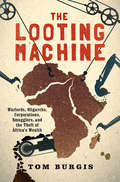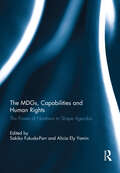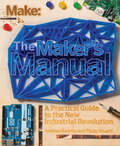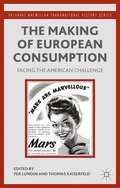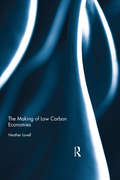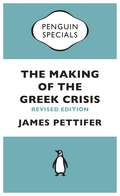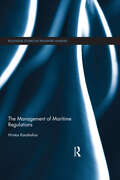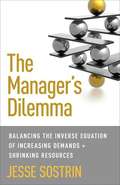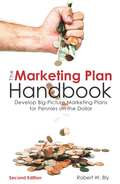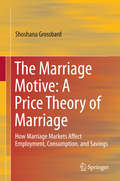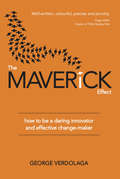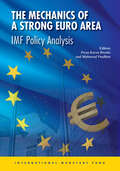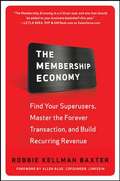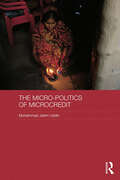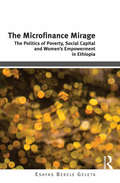- Table View
- List View
The Little Book of Clarity
by Jamie SmartImagine what you could achieve if you could only clear your mind The Little Book of Clarity shows you how to clear your head and get things done. Based on bestselling book, Clarity, this new edition has been distilled to the essentials, getting right to the point. With no vague theory or superfluous anecdotes, this book gets you right to work reducing stress and boosting productivity by uncovering your mind's in-built "self-clearing" capacity. As you begin to understand the concept of innate thinking, the benefits will start emerging in every corner of your life. As you think less, you'll win more -- at work, at home, and at the game of life as a whole. You'll rid your mind of clutter for good as you focus on what matters, and finally free up the time you need to pursue your dreams. Life's constant bombardment of "to-do" and "urgent" pushes your own priorities clear off the radar. Before you know it, you're always busy, but not getting very much accomplished. Personal goals fall by the wayside as you struggle just to keep up with day-to-day life. This book shows you how to cut the noise and clear the fog, and start working on what matters to you. Harness the power of insight and principles Discover your true identity and innate wisdom Build better relationships and stronger connections Discard toxic goals and pursue authentic desires Clarity is the mind's natural state, a state to which it will always return if given the chance. Although it's evident in children, most adults have had this ability conditioned out of them by our "go-go-go" society, leaving them mentally muddy, stressed, and ineffectual. The Little Book of Clarity helps you erase that conditioning and gain the peace of mind to live a life you love -- permanently.
The Little Book of Thinking Big
by Richard NewtonLong-awaited follow-up to the #1 bestselling Stop Talking, Start DoingYou can think big or you can think small, it all starts in the mind. What have you got to lose? If you aim for the stars you might just get there. Sometimes it pays off to think BIG and Richard Newton is here to get us thinking on a bigger scale than we ever imagined.With the right thinking tools and the right approach you can release your inspiration and creativity, reset your ambition and direct your attention to the things that truly matter to you. And that can change your life.Short and punchy with quick tips and inspiring graphics, The Little Book of Thinking Big will have your imagination, creativity and determination firing on all cylinders. You'll come away with a set of BIG goals to fuel and drive your BIG life.Here's where it starts. This is a reset button. Push it.Think bigger.
The Local Economy Solution: How Innovative, Self-Financing Pollinator Enterprises Can Grow Jobs and Prosperity
by Michael ShumanReinventing economic development as if small business matteredIn cities and towns across the nation, economic development is at a crossroads. A growing body of evidence has proven that its current cornerstone—incentives to attract and retain large, globally mobile businesses—is a dead end. Even those programs that focus on local business, through buy-local initiatives, for example, depend on ongoing support from government or philanthropy. The entire practice of economic development has become ineffective and unaffordable and is in need of a makeover. The Local Economy Solution suggests an alternative approach in which states and cities nurture a new generation of special kinds of businesses that help local businesses grow. These cutting-edge companies, which Shuman calls &“pollinator businesses,&” are creating jobs and the conditions for future economic growth, and doing so in self-financing ways. Pollinator businesses are especially important to communities that are struggling to lift themselves up in a period of economic austerity, when municipal budgets are being slashed. They also promote locally owned businesses that increase local self-reliance and evince high labor and environmental standards. The book includes nearly two dozen case studies of successful pollinator businesses that are creatively facilitating business and neighborhood improvements, entrepreneurship, local purchasing, local investing, and profitable business partnerships. Examples include Main Street Genome (which provides invaluable data to improve local business performance), Supportland (which is developing a powerful loyalty card for local businesses), and Fledge (a business accelerator that finances itself through royalty payments). It also shows how the right kinds of public policy can encourage the spread of pollinator businesses at virtually no cost.
The Locust and the Bee: Predators and Creators in Capitalism's Future
by Geoff MulganHow to harness capitalism's dynamism to create an economy that promotes well-being and rewards creationThe recent economic crisis was a dramatic reminder that capitalism can both produce and destroy. It's a system that by its very nature encourages predators and creators, locusts and bees. But, as Geoff Mulgan argues in this compelling, imaginative, and important book, the economic crisis also presents a historic opportunity to choose a radically different future for capitalism, one that maximizes its creative power and minimizes its destructive force.In an engaging and wide-ranging argument, Mulgan digs into the history of capitalism across the world to show its animating ideas, its utopias and dystopias, as well as its contradictions and possibilities. Drawing on a subtle framework for understanding systemic change, he shows how new political settlements reshaped capitalism in the past and are likely to do so in the future. By reconnecting value to real-life ideas of growth, he argues, efficiency and entrepreneurship can be harnessed to promote better lives and relationships rather than just a growth in the quantity of material consumption. Healthcare, education, and green industries are already becoming dominant sectors in the wealthier economies, and the fields of social innovation, enterprise, and investment are rapidly moving into the mainstream—all indicators of how capital could be made more of a servant and less a master.This is a book for anyone who wonders where capitalism might be heading next—and who wants to help make sure that its future avoids the mistakes of the past. This edition of The Locust and the Bee includes a new afterword in which the author lays out some of the key challenges facing capitalism in the twenty-first century.
The Long Process of Development
by Jerry F. Hough Robin GrierDouglass North once emphasized that development takes centuries, but he did not have a theory of how and why change occurs. This groundbreaking book advances such a theory by examining in detail why England and Spain developed so slowly from 1000 to 1800. A colonial legacy must go back centuries before settlement, and this book points to key events in England and Spain in the 1260s to explain why Mexico lagged behind the United States economically in the twentieth century. Based on the integration of North's institutional approach with Mancur Olson's collective action theory, Max Weber's theory of value change, and North's focus on dominant coalitions based on rent and military in In the Shadow of Violence, this theory of change leads to exciting new historical interpretations, including the crucial role of the merchant-navy alliance in England and the key role of George Washington's control of the military in 1787.
The Looting Machine
by Tom BurgisThe trade in oil, gas, gems, metals and rare earth minerals wreaks havoc in Africa. During the years when Brazil, India, China and the other "emerging markets” have transformed their economies, Africa’s resource states remained tethered to the bottom of the industrial supply chain. While Africa accounts for about 30 per cent of the world’s reserves of hydrocarbons and minerals and 14 per cent of the world’s population, its share of global manufacturing stood in 2011 exactly where it stood in 2000: at 1 percent. In his first book, The Looting Machine, Tom Burgis exposes the truth about the truth about the African development miracle: for the resource states, it's a mirage. The oil, copper, diamonds, gold and coltran deposits just attract a global network of traders, bankers, corporate extractors and investors who combine with venal political cabals to loot the states' value . And the vagaries of resource-dependent economies could pitch Africa’s new middle class back into destitution just as quickly as they climbed out of it. The ground beneath their feet is as precarious as a Congolese mine shaft; their prosperity could spill away like crude from a busted pipeline. This catastrophic social disintegration is not merely a continuation of Africa’s past as a colonial victim. The looting now is accelerating as never before. As global demand for Africa’s resources rises, a handful of Africans are becoming legitimately rich but the vast majority, like the continent as a whole, are being fleeced. Outsiders tend to think of Africa as a great drain of philanthropy. But look more closely at the resource industry and the relationship between Africa and the rest of the world looks rather different. In 2010, fuel and mineral exports from Africa were worth $333 billion, more than seven times the value of the aid that went in the opposite direction. But who received the money? For every Frenchwoman who dies in childbirth, 100 die in Niger alone, the former French colony whose uranium fuels France’s nuclear reactors. In petro-states like Angola three-quarters of government revenue comes from oil. The government is not funded by the people, and as result it is not beholden to them. A score of African countries whose economies depend on resources are rentier states; their people are largely serfs. The resource curse is not merely some unfortunate economic phenomenon, the product of an intangible force. What is happening in Africa’s resource states is systematic looting. Like its victims, its beneficiaries have names.
The Looting Machine
by Tom BurgisThe trade in oil, gas, gems, metals and rare earth minerals wreaks havoc in Africa. During the years when Brazil, India, China and the other "emerging markets” have transformed their economies, Africa’s resource states remained tethered to the bottom of the industrial supply chain. While Africa accounts for about 30 per cent of the world’s reserves of hydrocarbons and minerals and 14 per cent of the world’s population, its share of global manufacturing stood in 2011 exactly where it stood in 2000: at 1 percent. In his first book, The Looting Machine, Tom Burgis exposes the truth about the truth about the African development miracle: for the resource states, it's a mirage. The oil, copper, diamonds, gold and coltran deposits just attract a global network of traders, bankers, corporate extractors and investors who combine with venal political cabals to loot the states' value . And the vagaries of resource-dependent economies could pitch Africa’s new middle class back into destitution just as quickly as they climbed out of it. The ground beneath their feet is as precarious as a Congolese mine shaft; their prosperity could spill away like crude from a busted pipeline. This catastrophic social disintegration is not merely a continuation of Africa’s past as a colonial victim. The looting now is accelerating as never before. As global demand for Africa’s resources rises, a handful of Africans are becoming legitimately rich but the vast majority, like the continent as a whole, are being fleeced. Outsiders tend to think of Africa as a great drain of philanthropy. But look more closely at the resource industry and the relationship between Africa and the rest of the world looks rather different. In 2010, fuel and mineral exports from Africa were worth $333 billion, more than seven times the value of the aid that went in the opposite direction. But who received the money? For every Frenchwoman who dies in childbirth, 100 die in Niger alone, the former French colony whose uranium fuels France’s nuclear reactors. In petro-states like Angola three-quarters of government revenue comes from oil. The government is not funded by the people, and as result it is not beholden to them. A score of African countries whose economies depend on resources are rentier states; their people are largely serfs. The resource curse is not merely some unfortunate economic phenomenon, the product of an intangible force. What is happening in Africa’s resource states is systematic looting. Like its victims, its beneficiaries have names.
The Looting Machine: Warlords, Oligarchs, Corporations, Smugglers, and the Theft of Africa's Wealth
by Tom BurgisThe trade in oil, gas, gems, metals and rare earth minerals wreaks havoc in Africa. During the years when Brazil, India, China and the other "emerging markets” have transformed their economies, Africa’s resource states remained tethered to the bottom of the industrial supply chain. While Africa accounts for about 30 per cent of the world’s reserves of hydrocarbons and minerals and 14 per cent of the world’s population, its share of global manufacturing stood in 2011 exactly where it stood in 2000: at 1 percent. In his first book, The Looting Machine, Tom Burgis exposes the truth about the African development miracle: for the resource states, it's a mirage. The oil, copper, diamonds, gold and coltan deposits attract a global network of traders, bankers, corporate extractors and investors who combine with venal political cabals to loot the states' value. And the vagaries of resource-dependent economies could pitch Africa’s new middle class back into destitution just as quickly as they climbed out of it. The ground beneath their feet is as precarious as a Congolese mine shaft; their prosperity could spill away like crude from a busted pipeline. This catastrophic social disintegration is not merely a continuation of Africa’s past as a colonial victim. The looting now is accelerating as never before. As global demand for Africa’s resources rises, a handful of Africans are becoming legitimately rich but the vast majority, like the continent as a whole, is being fleeced. Outsiders tend to think of Africa as a great drain of philanthropy. But look more closely at the resource industry and the relationship between Africa and the rest of the world looks rather different. In 2010, fuel and mineral exports from Africa were worth $333 billion, more than seven times the value of the aid that went in the opposite direction. But who received the money? For every Frenchwoman who dies in childbirth, 100 die in Niger alone, the former French colony whose uranium fuels France’s nuclear reactors. In petro-states like Angola three-quarters of government revenue comes from oil. The government is not funded by the people, and as result it is not beholden to them. A score of African countries whose economies depend on resources are rentier states; their people are largely serfs. The resource curse is not merely some unfortunate economic phenomenon, the product of an intangible force. What is happening in Africa’s resource states is systematic looting. Like its victims, its beneficiaries have names.
The Loverly Wedding Planner: The Modern Couple's Guide to Simplified Wedding Planning
by Kellee KhalilYour Modern Guide for Planning a Wedding that's Perfectly YouPlanning a wedding can be a bit overwhelming, but with the helpful how-tos and insider advice in this handy guide, you can forget the stress and focus on creating a day that truly reflects you as a couple. The Loverly Wedding Planner has everything you need to navigate the planning process in a way that is simple, meaningful, and really enjoyable.Kellee and Loverly's team of experts will help you plan a memorable, and perfectly personalized wedding, with:- Updated advice for fast-evolving wedding customs like mixed-gender bridal parties, social media etiquette, unplugged weddings, same-sex ceremonies, and more- Wedding worksheets and timelines that will help you stay organized and on track with detailed schedules, budgets, and to-do lists- Down and dirty checklists to help you prioritize and streamline every step of the planning process - Insider tips from Kellee, the Loverly team, and real-life couples who have recently said "I do"- Budget breakdowns from modern couples with differing allowances and priorities, as well as a handy section on contracts and negotiation
The MDGs, Capabilities and Human Rights: The power of numbers to shape agendas
by Sakiko Fukuda-Parr and Alicia Ely YaminHeralded as opening a new chapter in international development, the Millennium Development Goals (MDGs) have led to the use of global goals and quantitative targets as a central instrument for defining global priorities. This book explores the implications of this new approach. How does target setting influence policy priorities of national governments, bilateral donors, multilateral agencies, NGOs, and other stakeholders? What are the intended and unintended consequences? Why is the use of numeric indicators effective? How does quantification reshape meanings of challenges such as women’s empowerment? Building on 11 case studies and a conceptual framework, this book provides a goal-by-goal analysis by leading specialists in the relevant fields. These specialists analyse the choices made, as well as the empirical and normative effects of the MDGs to offer insights for a more rigorous use of indicators and cautions on their limitations and perverse consequences. This book was originally published as a special issue of the Journal of Human Development and Capabilities.
The Maine Food Cluster Project
by Aldo Sesia Karen Gordon MillsThe Libra Foundation is exploring how to grow the food sector in Maine using the strategy of creating a food cluster initiative. Maine is one of the poorest states in the United States and the food sector is one of the largest employers. Multiple efforts in agriculture, aquaculture, and food processing exist but are not coordinated. The Foundation owns three food companies. Its CEO needs to decide what action if any the Foundation should take given the data from the Cluster Tool-a nation data set and other research on successful food cluster initiatives in other states.
The Maker's Manual: A Practical Guide to the New Industrial Revolution
by Patrick Di Justo Paolo Aliverti Andrea MaiettaThe Maker's Manual is a practical and comprehensive guide to becoming a hero of the new industrial revolution. It features dozens of color images, techniques to transform your ideas into physical projects, and must-have skills like electronics prototyping, 3d printing, and programming. This book's clear, precise explanations will help you unleash your creativity, make successful projects, and work toward a sustainable maker business. Written by the founders of Frankenstein Garage, which has organized courses since 2011 to help makers to realize their creations, The Maker's Manual answers your questions about the Maker Movement that is revolutionizing the way we design and produce things.
The Making of European Consumption
by Per Lundin Thomas KaiserfeldAmerican ideals and models feature prominently in the master narrative of post-war European consumer societies. This book demonstrates that Europeans did not appropriate a homogenous notion of America, rather post-war European consumption was a process of selective appropriation of American elements.
The Making of Low Carbon Economies
by Heather LovellThe Making of Low Carbon Economies looks at how more than two decades of sustained effort at climate change mitigation has resulted in a variety of new practices, rules and ways of doing things: a period of active construction of low carbon economies. From outer space observations of the carbon in tropical forests, to carbon financial reporting, and insulating solid masonry walls, these diverse things, activities and objects are integral to how climate change has been brought into being as a problem. The book takes a fresh look at society’s response to climate change by examining a diverse array of empirical sites where climate change is being made real through its incorporation into everyday lives – a process of stitching climate concerns into the discourse and practices of already existing economies, as well as creating new economies. The Making of Low Carbon Economies adds fresh insights to economic sociology and science and technology studies scholarship on the multiple origins and heterogeneous operation of markets, demonstrating the constraints and opportunities of an economic framing of the problem of climate change. It covers the obvious (and now well-researched) topic of carbon markets, as well as new more unusual material on the low carbon reframing of already existing markets and economies.
The Making of the Greek Crisis: New Revised Edition: 2015 (Penguin Specials)
by James PettiferPenguin Specials are designed to fill a gap. Written to be read over a long commute or a short journey, they are original and exclusively in digital form.The financial and social crisis in Greece has deep roots in the country's society and history. In this newly revised edition James Pettifer, the leading Balkan commentator and Oxford University historian brings us up to date with recent events in Greece. He explores the reasons for Greece's current situation, tracing the deep fissures caused by unresolved issues dating back to the Second World War, Greece's often difficult relationships with Turkey and the Balkan neighbours to the north, and its problematic position in the European Union. In 1981, Greece became the tenth member of what was then the European Economic Community, and for a time seemed to be making good progress in democratisation and economic development. Now that achievement is at serious risk.The author has extensive experience in Greece dating back to the time of the Colonels dictatorship in the early 1970s and its bitter aftermath. The Making of the Greek Crisis sets the scene for the country's intractable financial crisis and associated conflict with the European Union institutions in Brussels, and explains the practical, difficult choices facing the Greek people at this important turning point in their history.
The Management of Maritime Regulations (Routledge Studies in Transport Analysis)
by Hristos KarahaliosShip management is a worldwide activity. Modern ships are sophisticated designed structures equipped with several automatic devices. It is estimated that 90 per cent of commodities transported worldwide are carried by ships. Therefore there is great interest from many private and public organizations that those ships are operating, manned, designed and maintained within international acceptable standards. The obligation of stakeholders to comply with maritime regulations is included in most statutory and commercial agreements and therefore inadequate implementation of maritime regulations exposes stakeholders to commercial risks. This book explores how the application of mathematical decision-making tools could be used to manage maritime regulations. Performance management tools are proposed which would allow stakeholders to monitor the regulatory performance of their organization in order to reduce or eliminate those commercial risks. The process of introducing an implementation process for maritime regulations worldwide is described within this text. An emphasis is put on the role of main stakeholders in the regulatory process and reasons that increase the willingness of stakeholders to participate in the implementation of regulations. This book will be of interest to scholars and students interested in the management of the shipping industry as well as ship owners and managers who are charged with implementing maritime regulations.
The Manager’s Dilemma
by Jesse SostrinWhen 80% of managers say the demands they face are increasing—but the resources to meet those growing responsibilities are not—it signals a dangerous and unavoidable problem for the millions of managerial professionals embedded within every sector and industry of our economy. But there are no simple solutions to reduce the gap because this is no ordinary challenge. The Manager's Dilemma reveals how the tension between shrinking capacity and increasing demands forces managers into an unwanted status quo where they constantly struggle to make progress, but never really catch up. Which important goal rises above other priorities? Which 'fire of the day' gets extinguished while others are selectively ignored simply because they can't all be put out? When your dilemma sets in there is always unfinished business. In an effort to keep pace, you inadvertently begin to work against yourself in counterproductive ways that reduce your effectiveness and make your already scare supply of time, energy, resources, and focus even more tenuous. The harder you struggle, the more you lose the very performance edge you need to break the cycle. The good news is that the dilemma's triggers are swinging doors and within each one there is an alternative path that acts as an escape hatch. The heart of the book includes a series of eight principles and related tools that reveal the dilemma's core challenges and show managers at every level how to move beyond them. The poignant stories and vivid case examples bring hope–and a serious game plan–to any leader who is tipping precariously from overwhelmed to burned-out by the impossible conditions of their manager's dilemma.
The Marketing Plan Handbook
by Robert W. BlyDeliver Big-Picture Marketing Plans for Pennies on the DollarSuccessful marketing expert and copywriter Robert W. Bly cuts through the clutter of short-lived marketing techniques and trendy gimmicks to reveal the critical steps you need to cross over from business owner to marketplace competitor.Dishing bite-sized lessons, supported by in-chapter exercises and end-of-chapter actions, Bly coaches you in creating an effective marketing plan that produces the results of an expensive marketing consultant without the hefty cost.Learn how to:Develop a clear business visionPosition your business and services strategicallyResearch your market and target your ideal clientIntegrate online and offline marketingPut measurements in place to assess marketing tacticsCreate an effective implementation scheduleReview and troubleshoot for future success and growthWhether embarking on a new venture or reviving your current business plan, this practical handbook provides the next steps toward business success and survival.most pay a consultant for. Whether embarking on a new venture or reviving a current business, business owners need this practical handbook for market success and survival.
The Marriage Motive: A Price Theory of Marriage
by Shoshana GrossbardWhile this book contains numerous facts and empirical findings and touches on policy issues, its main contribution to the existing literature lies in the theoretical perspective it offers. The core of this book is a general equilibrium theory of labor and marriage presented in Chapter 2, which provides the conceptual framework for the rest of the chapters. Two major implications of the theory are sex ratio effects and compensating differentials in marriage. The book demonstrates how a few core concepts, linked via economic analysis, help explain a multitude of findings based on statistical analyses of data from a wide variety of cultures. It is hoped that readers of this book will improve their understanding of how marriage works to help us design better economic and social policies as well as help people live better and happier lives, making the book of interest to not only economists but sociologists and anthropologists as well.
The Maverick Effect: How to be a Daring Innovator and Effective Change-Maker
by George VerdolagaIn business guru George Verdolaga's new guide to tackling life and business head on, he brings the focus onto people who embody the characteristics of a maverick. Mavericks are the change-makers and ground-breakers who set the trends that hipsters follow. As the business world continues to change, those who identify as outsiders can provide unique and invaluable perspectives, and with the right confidence can become innovative mavericks themselves. The Maverick Effect uses relatable and real-life examples to evaluate the traits, practices, and routines that make mavericks successful. Verdolaga provides comprehensible how-to advice, paving the path for anyone who has the drive to embrace the lifestyle of a maverick. Set yourself apart from the herd. Take the initiative, give back to your community, be different: and others will follow.
The Mechanics of a Strong Euro Area: Imf Policy Analysis
by Koeva Petya, Mahmood PradhanA report from the International Monetary Fund.
The Membership Economy: Find Your Super Users, Master the Forever Transaction, And Build Recurring Revenue
by Robbie Kellman BaxterIn today's business world, it takes more than a website to stay competitive. The smartest, most successful companies are using radically new membership models, subscription-based formats, and freemium pricing structures to grow their customer base--and explode their market valuation--in the most disruptive shift in business since the Industrial Revolution. This is The Membership Economy. Written by an expert consultant, this groundbreaking book will show you how to turn ordinary customers into members for life. Learn how to: Turn digital subscriptions into forever sales Build an online community your customers will love Develop new loyalty programs that really pay off Transform freemium users into superusers Create a self-generating revenue stream Keep memberships and profits growing for years to come Whether you're a small business with limited resources, an established company using a traditional business model, or a hungry start-up who wants a bigger bang for your buck, this comprehensive guide provides a wealth of membership-building options to suit every need. You'll learn the best-kept secrets of top industry leaders, from global giants like Am Ex and Weight Watchers to smaller dot-com successes like SurveyMonkey and Pandora. You'll find proven strategies for creating membership programs for everything from vacation timeshares and car rentals to video streaming and Software-as-a-Service. Most importantly, you'll discover what works, and what doesn't, from some of the key players in the new membership economy. It's not about ownership; it's about access, options, and freedom. When you join forces with your customers, membership has its rewards--for you, your company, and your continued success.
The Merchant Republics
by Mary Lindemann"The Merchant Republics analyzes the ways in which three major economic powerhouses -- Amsterdam, Antwerp and Hamburg -- developed dual identities as 'communities of commerce' and as republics over the course of the long eighteenth century (c. 1648-1790). In addition to discussing the qualities that made these three cities alike, this volume also considers the very real differences that derived from their dissimilar histories, political structures, economic fates and cultural expectations. While all valued both their republicanism and their merchant identities, each presented a different face to the world and each made the transition from an early modern republic to a modern city in a different manner"--
The Micro-politics of Microcredit: Gender and Neoliberal Development in Bangladesh (ASAA Women in Asia Series)
by Mohammad Jasim UddinMicrocredit has been seen in recent decades as having great potential for aiding development in poor developing countries, with Bangladesh being one of the countries which has pioneered microcredit and implemented it most widely. This book, based on extensive original research, explores how microcredit works in practice, and assesses its effectiveness. It discusses how microcredit, usually channelled through women, is often passed to the men of the family, a practice disapproved of by some, but regarded as acceptable by borrowers who have a communal approach to debt, rather than viewing debt as something held by single individuals. The book demonstrates how the rules around microcredit are often seem as irksome by the borrowers, how lenders often charge high rates of interest and work primarily to preserve their institutions, thereby going against the spirit of the microcredit movement, and how borrowers often end up on a downward spiral, deeper and deeper in debt. Overall, the book argues that although microcredit does much good, it also has many drawbacks.
The Microfinance Mirage: The Politics of Poverty, Social Capital and Women's Empowerment in Ethiopia
by Esayas Bekele GeletaMicrofinance has long been considered a development strategy that can correct the failure of the global credit market and address the financial needs of the poor enabling them to create and run profitable business enterprises. The Microfinance Mirage argues that this neo-liberal oriented analysis overemphasises the economic argument whilst ignoring the cultural roots of inequality and subordination. Drawing on ethnographic research conducted among rural credit clients in the Northern region of Ethiopia, Esayas Bekele Geleta provides a nuanced critical analysis of microfinance challenging the common assumption that it facilitates the building of social capital, poverty reduction and the empowerment of women. Making a unique contribution to our further understanding of the microfinance industry the research shows that, in some cases, microfinance can result in the disintegration of pre-existing relationships and in the disruption and destruction of the livelihoods of the poor. Exploring the impact of microfinance in one of the poorest regions of sub-Saharan Africa, this book demonstrates its potential and problems and shows the complex and contradictory social and cultural environments in which projects are often located.
